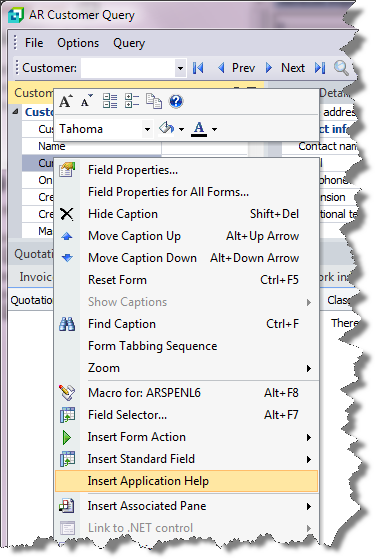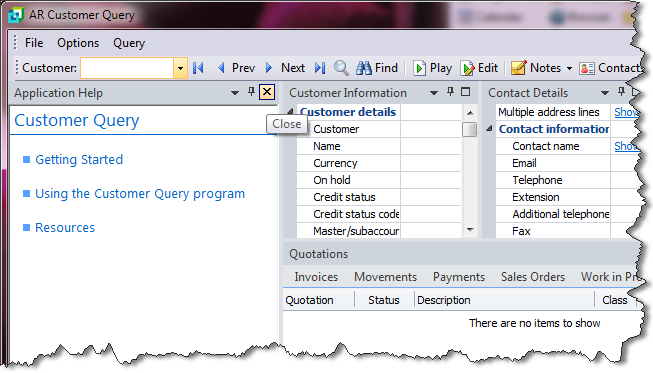You use this program to maintain the codes that are used to classify different methods of payment made by customers.
| Field | Value | Description | ||||||||
|---|---|---|---|---|---|---|---|---|---|---|
| Toolbar and menu options | ||||||||||
| Payment type | Indicate the code of the payment type you want to add or
maintain. This cannot start with an underscore character as this is reserved for internal usage within the Sales Order Entry program for cash discounts (_DSC) adjustments (_ADJ) on account payments (_ACT) and deposits (_DEP). |
|||||||||
| Payment code | This indicates the code of the payment type you are currently maintaining. | |||||||||
| Description | This describes the payment code. | |||||||||
| Currency | Indicate the currency in which payments to this code must be made. This is only enabled if you have enabled the Foreign currency sales required setup option (Accounts Receivable Setup). | |||||||||
| Banking details | ||||||||||
| Deposit in bank |
Select this for payments made using this code to be deposited in the bank, and a deposit slip printed by the AR Bank Deposit Slip program. If you do not select this option, then this payment type cannot be deposited in the bank and no deposit slip is printed. You would typically select this option for coupons or other non-monetary payment types. Additionally, you must not select this option if you are defining a payment type for cash for use in counter sales.
If you do not select this option, then the system uses the ledger code assigned to the payment type (seeCounter Sales Payments Interface), as opposed to the Cash account ledger code held against the bank (see Browse on Banks).
|
|||||||||
| Bank |
You use this field to indicate the SYSPRO bank to which deposits must be made for this payment code. If you do not require foreign currency sales, you can only enter a local currency bank. If a foreign cash book is installed, and the payment type is for a foreign currency, then the currency of the bank must be either your local currency or the currency in which the payment is being made.
|
|||||||||
| Payment types | ||||||||||
| Payment types for A/R |
You use this field to indicate the Accounts Receivable payment type that most closely matches the counter sales payment type. This is used for the printing of the AR Cash Journal Report and the AR Bank Deposit Slip. If you specified a foreign currency code at the Currency field, the payment type is automatically set to Other and cannot be changed. The following payment types can be selected:
|
|||||||||
| Request bank deposit slip details |
Select this to indicate that you want to enter additional details for the bank deposit slip. At the time of entering the payment for a Counter Sales invoice, you will be prompted for the drawer's name, bank and the bank's branch.
|
|||||||||
| Payment details | ||||||||||
| Usually full payment |
Select this if the payment type is usually receipted in full, to the exact amount of the invoice. This is usually the case with checks and credit card payments. Selecting this option removes the need to enter the payment amount manually. You can however, override the payment amount if required. |
|||||||||
| Can make change |
Select this if you require change to be made for cash payments. This option is usually not applicable to checks and credit cards. You will be unable to access this option if you selected the Credit Card option. |
|||||||||
| Allow to overpay invoice |
Select this to allow payment amounts using this payment type to exceed the unpaid balance of the invoice. For example: Your company may have a policy of not accepting credit card payments for an amount greater than the invoice value, since any overpayment would be refunded in cash. You would want to prevent this from happening because you pay a commission on cash given in this manner to your customer. You will be unable to access this option if you selected the Can make change option. |
|||||||||
| Request statement reference |
Select this if you require an eight character statement reference to be requested automatically each time you receive payments using this payment code. If you do not select this option you can still enter a statement reference at the time of accepting this payment code. The statement reference is printed on statements and reports. |
|||||||||
| Request journal notation |
Select this if you require a 50 character journal notation to be requested automatically each time you receive a payment using this payment code. If you do not select this option you can still enter a journal notation at the time of accepting this payment code. The notation is printed on the AR Cash Journal Report. |
|||||||||
| Credit card details | ||||||||||
| Credit Card | Select this if payment for this payment code is by credit card. | |||||||||
| Commission percentage |
Indicate the percentage of commission to be applied to the credit card. A summary of the commission calculated is displayed against the payment type in the Counter Sales Deposit Query and Counter Sales Report programs. |
|||||||||
| Request card no, expiry, authorization | Indicates you require credit card information to be entered at the time of accepting payment by credit card. | |||||||||
| Minimum value for authorization |
Indicates the minimum value that must be paid for using this payment type before an authorization number is requested as part of the credit card details. Enter zero if there is no minimum value or you always require an authorization number to be requested. |
|||||||||
| Request start date | Select this to record the credit card start date at the time of accepting payments by credit card. | |||||||||
Application Help Panes provide step-by-step instructions for various functions within the program, including a brief overview of what the program does, what setup options are required and how to personalize the program. The intention is that the pane provides information that is uncluttered and easy to navigate.
You can embed an Application Help Pane:
-
in the main SYSPRO menu
-
in any program with panes, if not using roles
-
when adding a role layout in Design Mode.
Inserting Application Help
You would typically follow this procedure to display help for the current program in a customized pane that can be pinned to the program window.
Information includes step-by-step instructions for the various functions available within the program, including a brief overview of what the program does, what setup options are required and how to personalize the program.
-
Open the program for which you want to insert application help into a customized pane.
This functionality is only available for a program that has panes.
-
Right-click any form field.
You can also click the triangle menu icon that appears in the title area of a pane.
-
Select Insert Application Help from the context-sensitive menu.
The application help appears in a pane within your program. You can reposition the pane using the docking stickers or pin it to the program window.
Removing the Application Help pane
If you no longer want to display application help in a pane for your current program, you can simply remove it.
-
Select the Close icon in the right-hand corner of the application help pane.
-
Confirm that you want to delete the pane.
![[Note]](images/note.png)

